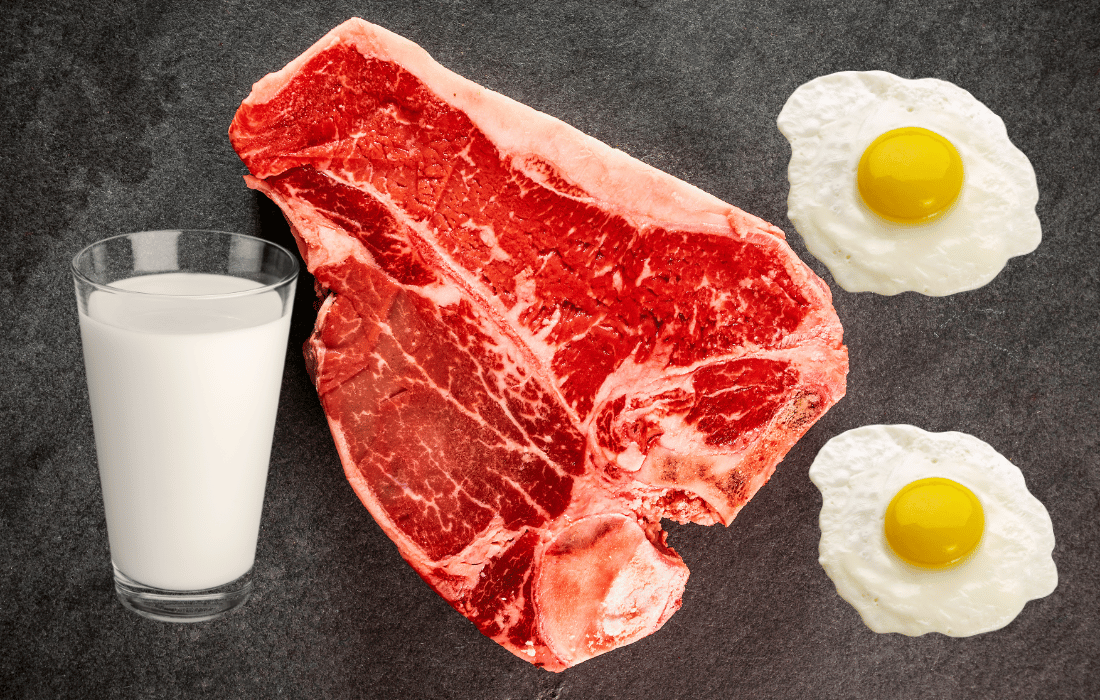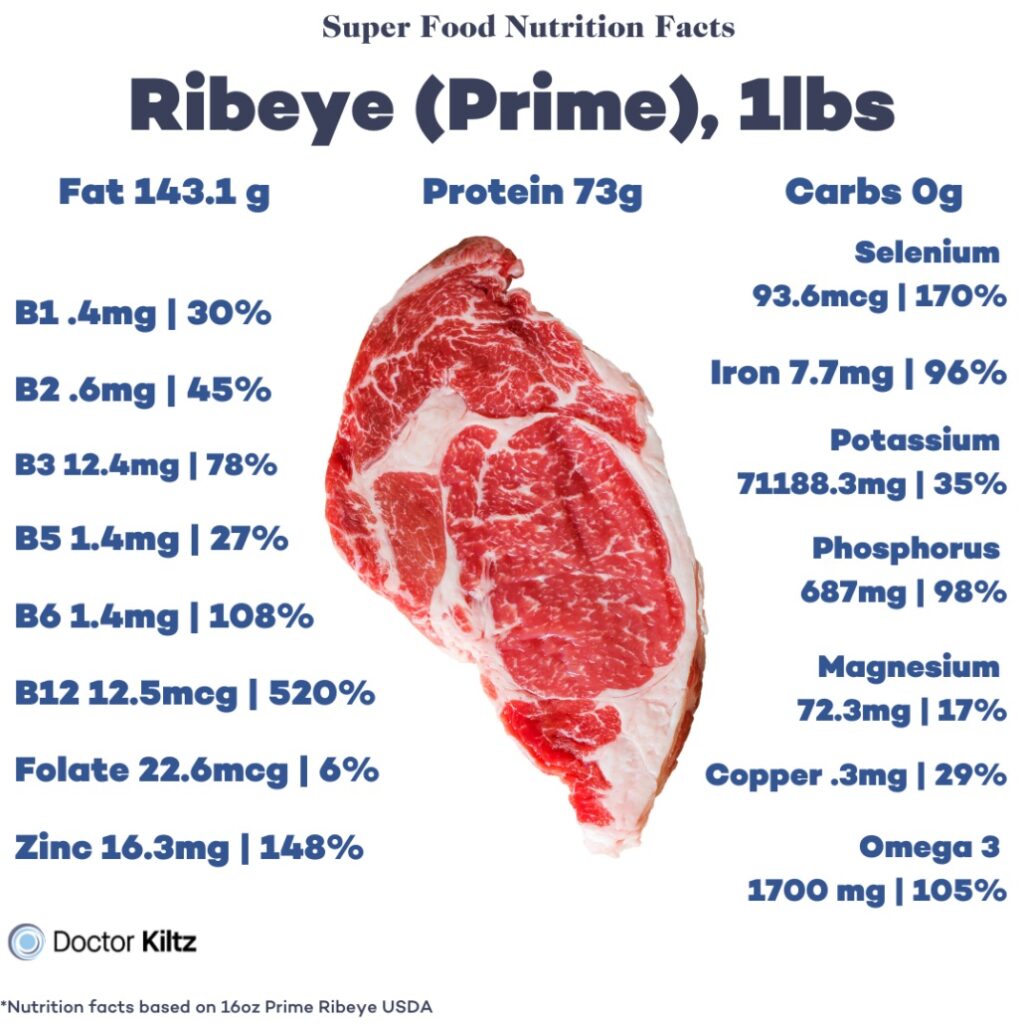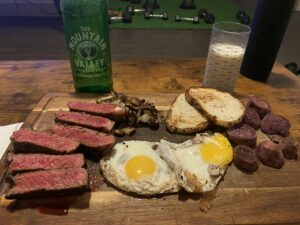The Biological Foundation: Why Testosterone Matters
Testosterone is more than just the hormone that fuels masculinity; it’s integral to overall health, influencing muscle mass, bone density, fat distribution, red blood cell production, and even mood and cognitive function. For men, maintaining optimal testosterone levels is crucial, especially as natural production tends to decline with age.
Various factors can affect testosterone levels, including lifestyle choices, stress, sleep, and, importantly, diet. The foods we consume provide the building blocks for hormone production, and an animal-based diet, rich in high-quality proteins, fats, vitamins, and minerals, offers the most effective foundation for maintaining and boosting testosterone levels.
Grass-Fed and Grass-Finished Beef: A Nutritional Powerhouse
When discussing the benefits of an animal-based diet, grass-fed and grass-finished beef often takes center stage, and for good reason. This type of beef is not only more environmentally sustainable compared to its grain-fed counterparts, but it is also significantly richer in nutrients that are directly linked to testosterone production.
Zinc: The Testosterone Catalyst
Zinc is one of the most critical minerals for testosterone production. It acts as a cofactor in numerous enzymatic reactions involved in hormone synthesis. Studies have shown that men with adequate zinc levels tend to have higher testosterone levels, while a zinc deficiency can lead to significant reductions in testosterone.
Grass-fed beef is a superb source of zinc, providing more bioavailable zinc than any plant-based source. While you can obtain zinc from legumes and seeds, the bioavailability of zinc from animal products like beef is far superior. This means your body can absorb and utilize the zinc more effectively, leading to better testosterone support.
Saturated Fats and Cholesterol: Essential for Hormone Production
For years, saturated fats and cholesterol have been vilified, but modern research is beginning to shed light on their crucial role in hormone production. Testosterone is synthesized from cholesterol, and without sufficient dietary intake, the body may struggle to produce adequate levels of this vital hormone.
Grass-fed beef is rich in healthy fats, including saturated fats, which provide the necessary building blocks for testosterone. In contrast to the trans fats found in processed foods, the saturated fats in grass-fed beef are beneficial, supporting not only testosterone levels but also overall cardiovascular health.
Omega-3 and CLA: Anti-Inflammatory Powerhouses
Grass-fed beef also contains higher levels of omega-3 fatty acids and conjugated linoleic acid (CLA) compared to grain-fed beef. Both of these compounds have anti-inflammatory properties, which are crucial because chronic inflammation can suppress testosterone production.
Science shows us that inflammation negatively impacts the hypothalamus and pituitary glands, which regulate testosterone production. By consuming grass-fed beef rich in omega-3s and CLA, you can help mitigate inflammation and support the hormonal systems that drive testosterone production.
Raw Milk: A Nutritional Juggernaut for Testosterone
Raw milk, often described as “nature’s perfect food,” is another cornerstone of an animal-based diet that can profoundly impact testosterone levels. Unlike pasteurized milk, raw milk retains its full spectrum of nutrients, including enzymes, probiotics, vitamins, and minerals that are essential for hormone health.
Calcium and Vitamin D: Partners in Testosterone Production
Calcium is well-known for its role in bone health, but it also plays a role in hormone secretion, including testosterone. Research has shown that men who consume adequate levels of calcium tend to have higher testosterone levels.
Vitamin D, often referred to as the “sunshine vitamin,” is another critical nutrient for testosterone production. A randomized controlled trial published in Hormone and Metabolic Research found that men with higher vitamin D levels had significantly higher testosterone levels than those with lower levels. Raw milk naturally contains both calcium and vitamin D, making it a potent ally in the quest for optimal testosterone.
Protein and Fat: The Dynamic Duo
Raw milk is a rich source of high-quality protein and fat, both of which are essential for testosterone production. The proteins in raw milk, particularly casein and whey, provide all the essential amino acids needed for muscle repair and growth, which in turn supports healthy testosterone levels.
The fats in raw milk, including saturated fats and cholesterol, provide the raw materials needed for testosterone synthesis. As mentioned earlier, cholesterol is the precursor to all steroid hormones, including testosterone, making raw milk an ideal food for supporting hormone health.
Enzymes and Probiotics: Enhancing Absorption and Digestion
One of the key advantages of raw milk over pasteurized milk is its enzyme and probiotic content. Enzymes like lactase and lipase aid in the digestion and absorption of nutrients, ensuring that your body can fully utilize the vitamins, minerals, and fats in the milk.
Probiotics, the beneficial bacteria found in raw milk, support gut health, which is increasingly recognized as essential for hormone balance. A healthy gut microbiome can improve the absorption of nutrients necessary for testosterone production while also helping to reduce inflammation that can impair hormone synthesis.
Eggs: The Perfect Package for Testosterone
Eggs, often labeled as nature’s multivitamin, are another vital component of an animal-based diet that supports testosterone levels. They are nutrient-dense, providing a host of vitamins and minerals that are essential for overall health and hormone production.
Cholesterol and Saturated Fats: Building Blocks for Testosterone
As with grass-fed beef and raw milk, eggs are rich in cholesterol and saturated fats, both of which are crucial for testosterone synthesis The yolk, in particular, is where these nutrients are concentrated. Despite the outdated fear of cholesterol, consuming whole eggs has been shown to increase testosterone levels without adversely affecting heart health.
Studies have found that men who consumed whole eggs had higher testosterone levels and better overall health markers compared to those who avoided the yolks. This underscores the importance of including the entire egg in your diet to maximize the benefits of testosterone production.
Vitamin D: A Boost from the Yolks
Egg yolks are one of the few natural food sources of vitamin D, a nutrient that plays a significant role in testosterone production. As mentioned earlier, vitamin D deficiency is linked to lower testosterone levels, so consuming eggs can help ensure you’re getting enough of this critical hormone-supporting vitamin.
B Vitamins: Vital for Energy and Hormone Production
Eggs are an excellent source of B vitamins, particularly B6 and B12, which are essential for energy production and hormone balance. B vitamins help convert food into energy, support nervous system function, and are involved in the production of hormones like testosterone.
Research has found that B vitamins, particularly B6, play a role in regulating testosterone levels. Ensuring you get enough B vitamins from whole foods like eggs can help maintain healthy testosterone levels and overall energy.
Organic Raw Honey: A Sweet Ally for Testosterone
Organic raw honey, often celebrated for its rich flavor and natural sweetness, is more than just a delicious addition to your diet—it can also play a supportive role in boosting testosterone levels. Unlike processed honey, which is often stripped of its beneficial nutrients through heating and filtering, organic raw honey retains its full spectrum of vitamins, minerals, and enzymes, making it a potent ally in men’s health.
 The Nutritional Profile of Raw Honey
The Nutritional Profile of Raw Honey
Organic raw honey is packed with essential nutrients that can contribute to overall health and well-being. It contains a variety of vitamins and minerals, including vitamin B6, thiamin, niacin, riboflavin, and pantothenic acid, all of which are crucial for energy production and hormone synthesis. Additionally, raw honey provides a range of antioxidants, including flavonoids and phenolic acids, which help combat oxidative stress—a known factor that can negatively impact testosterone levels.
Honey’s Role in Hormonal Balance
Several studies have suggested that the natural sugars and nutrients in raw honey can positively influence hormone levels, including testosterone. For example, this study found that the regular consumption of honey improved serum testosterone levels in male athletes, particularly when combined with physical exercise. The study highlighted honey’s ability to modulate insulin levels, which can indirectly support testosterone production by reducing inflammation and oxidative stress.
Boosting Nitric Oxide Levels
Nitric oxide is a crucial molecule involved in vasodilation, which increases blood flow to various organs, including the testes, where testosterone is produced. Organic raw honey has been shown to boost nitric oxide levels, which can enhance blood flow and support healthy testosterone levels. A study published in the International Journal of Molecular Sciences indicated that the antioxidant properties of honey contribute to increased nitric oxide production, potentially leading to improved testosterone synthesis and sexual health.
Enhancing Sleep Quality
Quality sleep is essential for maintaining optimal testosterone levels, as the majority of testosterone release occurs during deep sleep. Organic raw honey can promote better sleep by stabilizing blood sugar levels throughout the night, ensuring a steady supply of liver glycogen. This prevents stress hormones like cortisol from spiking, which can disrupt sleep and negatively impact testosterone production. Several studies have discussed the sleep-enhancing properties of honey, noting that its natural sugars can improve overall sleep quality, which is vital for hormonal balance.
The Holistic Impact: Combining Grass-Fed Beef, Raw Milk, and Eggs
Individually, grass-fed beef, raw milk, and eggs are nutritional powerhouses, but when combined, they create a synergistic effect that can profoundly impact testosterone levels and overall health. This trio provides a full spectrum of nutrients, from high-quality proteins and healthy fats to essential vitamins and minerals, all of which are crucial for supporting optimal testosterone levels.
By incorporating these foods into your daily diet, you’re not just fueling your body with the nutrients it needs for testosterone production, but you’re also supporting your overall health, energy levels, and longevity.
Addressing Common Concerns: Cholesterol, Heart Health, and Misconceptions
One of the most common concerns about an animal-based diet is its impact on cholesterol and heart health. However, the relationship between dietary cholesterol and heart disease is far more complex than previously thought.
Recent studies have shown that for most people, dietary cholesterol does not significantly impact blood cholesterol levels. Instead, the body regulates cholesterol production based on dietary intake, meaning that consuming foods like eggs, beef, and raw milk is unlikely to raise your blood cholesterol to harmful levels.
In fact, these foods can improve your lipid profile by increasing levels of HDL (good) cholesterol while reducing triglycerides and inflammation. The fats and cholesterol found in these foods are essential for hormone production and overall health, making them vital components of a diet focused on boosting testosterone.
Practical Tips: Incorporating These Foods into Your Diet
To maximize the benefits of an animal-based diet for testosterone, it’s important to source high-quality, organic, and pasture-raised products whenever possible. Here are some practical tips for incorporating grass-fed beef, raw milk, and eggs into your daily routine:
 Breakfast: Start your day with a hearty breakfast of eggs cooked in grass-fed butter or tallow, paired with a glass of raw milk. This combination provides a powerful dose of protein, healthy fats, and essential vitamins to kickstart your day.
Breakfast: Start your day with a hearty breakfast of eggs cooked in grass-fed butter or tallow, paired with a glass of raw milk. This combination provides a powerful dose of protein, healthy fats, and essential vitamins to kickstart your day.Lunch or Dinner: Include a serving of grass-fed and grass-finished beef in your main meals. Whether it’s a steak, ground beef, or a roast, this nutrient-dense meat will provide the zinc, iron, and protein necessary for supporting testosterone.
Snacks: Raw milk with or without honey can also be enjoyed as a snack or post-workout recovery drink. Its blend of protein, fats, and carbs makes it an ideal choice for replenishing energy and supporting muscle repair.
Cooking: Use animal fats like beef tallow or ghee from grass-fed cows for cooking. These fats are not only more stable at high temperatures but also add a rich flavor and nutritional boost to your meals.
Conclusion: Embrace the Power of an Animal-Based Diet for Optimal Testosterone
In the quest for optimal testosterone levels and overall men’s health, an animal-based diet stands out as a powerful ally. Grass-fed and grass-finished beef, raw milk, and eggs provide the essential nutrients needed for hormone production, muscle growth, and energy. By embracing these foods, you’re enhancing your testosterone levels and supporting your body’s overall health, performance, and longevity.
In a world where dietary trends come and go, the time-tested wisdom of consuming whole, unprocessed animal foods remains steadfast. So, the next time you’re planning your meals, consider the profound impact that these nutrient-dense foods can have on your testosterone levels and men’s health. Your body will thank you.



 The Nutritional Profile of Raw Honey
The Nutritional Profile of Raw Honey Breakfast: Start your day with a hearty breakfast of eggs cooked in grass-fed butter or tallow, paired with a glass of raw milk. This combination provides a powerful dose of protein, healthy fats, and essential vitamins to kickstart your day.
Breakfast: Start your day with a hearty breakfast of eggs cooked in grass-fed butter or tallow, paired with a glass of raw milk. This combination provides a powerful dose of protein, healthy fats, and essential vitamins to kickstart your day.





